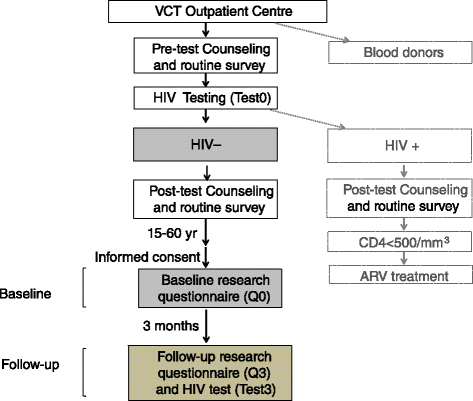Factors that lead to changes in sexual behaviours after a negative HIV test: protocol for a prospective cohort study in Kinshasa
- PMID: 27439981
- PMCID: PMC4955130
- DOI: 10.1186/s12889-016-3285-5
Factors that lead to changes in sexual behaviours after a negative HIV test: protocol for a prospective cohort study in Kinshasa
Abstract
Background: Considering the high percentage of couples in which one or both members are HIV negative, the frequency of transmission among non-regular partners and the probabilities of non-disclosure, attention should be paid to people getting a negative HIV test at the Voluntary Counseling and Testing (VCT). Research has shown that a negative HIV test may be followed by a change in sexual behaviours. In Sub-Saharan Africa, where most HIV infections occur, there are few studies that have analysed the factors associated with changes in sexual risk behaviours after a negative HIV test at the VCT clinic. The aim of this project is to evaluate the specific factors associated with changes in sexual behaviours, three months after a negative result in an HIV test, and to analyse the effect of counseling and testing on HIV-related knowledge of participants in an outpatient centre of Kinshasa (Democratic Republic of Congo).
Methods and design: Prospective cohort study from December 2014 until March 2016. People 15-60 year old that received VCT at Monkole Hospital (Kinshasa) were followed three months after they got a negative HIV test. In a face-to-face interview, participants replied to a baseline and a follow-up research questionnaire on HIV-related knowledge, attitudes and behaviours. At follow-up respondents were also offered a new HIV test and additional HIV counseling. Four hundred and fifteen participants completed the baseline questionnaire and 363 (87 %) came back for their 3-month follow up.
Discussion: This is the first longitudinal study in the DRC that evaluates the factors associated with changes in sexual behaviours after a negative HIV test at the VCT. Participants attending the VCT services within a clinical setting are a good study population as they can be good transmitters of preventive information for other people with no access to health facilities.
Keywords: Africa; Behaviour; Cohort; HIV; Knowledge; Negative test; Sexual; Voluntary Counseling and Testing (VCT).
Figures
References
-
- WHO . Global Health Sector Strategy on HIV, 2016–2021. Draft for consultation. 2015.
MeSH terms
LinkOut - more resources
Full Text Sources
Other Literature Sources
Medical



